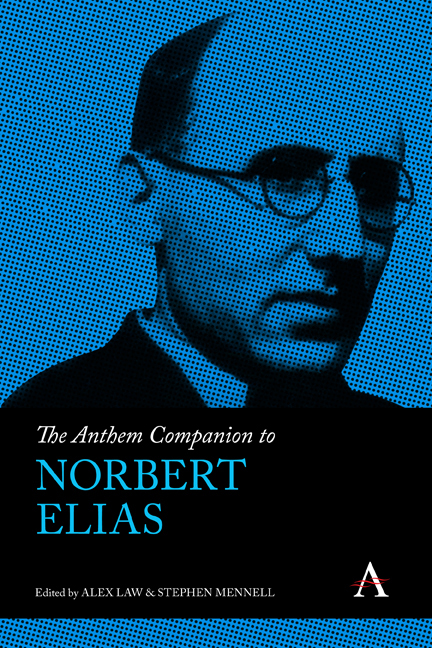Book contents
- Frontmatter
- Contents
- Notes On Contributors
- Acknowledgments
- Introduction: The Sociological Promise of Norbert Elias
- One Norbert Elias: Genesis of a Determined Thinker
- Two Knowledge, Science and Method: The Sociological Practice of Norbert Elias
- Three Norbert Elias’s Comparative Historical Sociology: Against Process Reduction
- Four Power and Process: Norbert Elias and the Paradox of Inequalities
- Five Norbert Elias and Shifting Gender Relations
- Six Travelling With Elias: Figurations and the Racialising Process in South Africa
- Seven Excitement Processes, Embodiment and Power Relations in Sport and Leisure
- Eight Warfare, Survival Units, National Habitus and Nationalism: Norbert Elias’s Contribution to Political Sociology
- Nine Elias’s Contribution to International Relations Theory: Towards a Global Sociology
- Ten Crime, Government and Civilisation: Rethinking Elias in Criminology
- Eleven Art and the Civilising Process
- Twelve From Social Mobility to Channels of Opportunity: Norbert Elias and Education
- Appendix: Published Works of Norbert Elias in English
- Index
Ten - Crime, Government and Civilisation: Rethinking Elias in Criminology
Published online by Cambridge University Press: 28 February 2024
- Frontmatter
- Contents
- Notes On Contributors
- Acknowledgments
- Introduction: The Sociological Promise of Norbert Elias
- One Norbert Elias: Genesis of a Determined Thinker
- Two Knowledge, Science and Method: The Sociological Practice of Norbert Elias
- Three Norbert Elias’s Comparative Historical Sociology: Against Process Reduction
- Four Power and Process: Norbert Elias and the Paradox of Inequalities
- Five Norbert Elias and Shifting Gender Relations
- Six Travelling With Elias: Figurations and the Racialising Process in South Africa
- Seven Excitement Processes, Embodiment and Power Relations in Sport and Leisure
- Eight Warfare, Survival Units, National Habitus and Nationalism: Norbert Elias’s Contribution to Political Sociology
- Nine Elias’s Contribution to International Relations Theory: Towards a Global Sociology
- Ten Crime, Government and Civilisation: Rethinking Elias in Criminology
- Eleven Art and the Civilising Process
- Twelve From Social Mobility to Channels of Opportunity: Norbert Elias and Education
- Appendix: Published Works of Norbert Elias in English
- Index
Summary
Can we think without shame and remorse that more than half of those wretches who have been tied up at Newgate in our time might have been enjoying liberty and using that liberty well - that such a hell on earth as Norfolk Island need never have existed - if we had expended in training honest men but a small part of what we have expended in hunting and torturing rogues? I say, therefore, that the education of the people is… the best means of attaining that which all allow to be a chief end of Government….
Lord Macaulay (quoted by Henry Parkes 1876, 219)Introduction
Some types of harm inflicted by human beings upon each other are dealt with either informally, such as insults, bad manners and sexual infidelity, or via civil law generally pursued by the individual or organisation harmed, but under state supervision of via the mechanisms of the legal system. Others are more likely to respond in institutionalised ways, such as assault, fraud, theft, sexual abuse and murder, whether as individuals or as collective entities such as organisations or states. The response to each of these types of harm is associated with corresponding doctrines, procedures and courts for dealing with them: civil wrongs and criminal wrongs pursued by the state. The distinction is not rigid: the state also initiates actions in the general interest in civil law, many civil sanctions bear strong resemblances to criminal penalties (Mann 1992), and civil law is still ultimately backed by the sanctions of criminal law. Its boundaries also shift over time, so that one can observe over time a gradual expansion of the kinds of harms covered by criminal law.
The state's assumption of responsibility for the imposition of the sanctions of the criminal justice system, its infliction of punishment and direct constraint of individual liberties and rights, in the name of society as a whole, is also central to the selfunderstanding of modern sovereignty, as the first Chief Justice of Australian High Court, Sir Samuel Griffith, stated in 1915:
The judicial power is a part of the right of sovereignty. It extends to the administration of justice in respect as well of violations of the law which entail penal consequences as to infractions of civil rights.
- Type
- Chapter
- Information
- The Anthem Companion to Norbert Elias , pp. 185 - 204Publisher: Anthem PressPrint publication year: 2023



